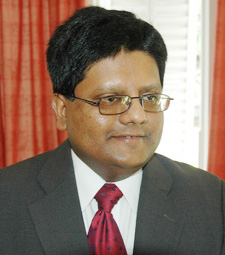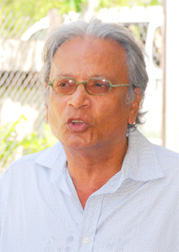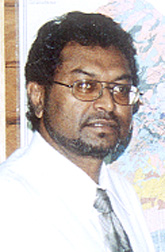AFC’s Chairman Khemraj Ramjattan told Stabroek News recently that all the parties represented in parliament should work together on their legislative agenda noting that in all the action plans and manifestos of the parties represented in parliament there are areas of commonality. He indicated that the establishment of the Public Procurement Commission is a priority for his party, indicating that it could help to reduce corruption in the country.

The Public Procurement Commission is yet to be established as the government and the Opposition over the years have had disagreements about the numerical composition of the Commis-sion, which is one of the constitutional commissions. President Donald Ramotar, while campaigning ahead of the November 28 polls, had said that his government would be pushing for the establishment of the Com-mission. Ramotar had promised to fight against corruption and the perception of corruption should he assume office.
On Friday, during a seminar hosted by Transparency International Guyana Inc. (TIGI), Finance Minister Dr Ashni Singh indicated that he believes all political parties will aim for the establishment of the Procurement Commis-sion.
The selection of nominees to the commission is the responsibility of the National Assembly’s Public Accounts Committee (PAC) which is chaired by the Parliamentary Opposition. Both the government and the opposition have to provide a list of nominees to the PAC.
Ramjattan said that the AFC hopes that the Procure-ment Commission and the Public Accounts Committee (PAC) together can provide effective scrutiny to the award of all government contracts. He said that the party would be particularly interested in having these two bodies investigate retroactively some of the more controversial contracts the PPP/C administration had entered into in recent times.

Meanwhile, APNU’s deputy leader Rupert Roopnaraine told Stabroek News that his party has committed itself to the proper establishment of all these constitutional commissions including the Public Procure-ment Commission, the Public Service Commission, the Ethnic Relations Commission and others.
He said that the party is also fully committed to reforming the electoral system, noting that the PPP/C has never properly addressed this issue in keeping with the Hermandston Accord in 1998 between then President Janet Jagan and then Opposition Leader Desmond Hoyte.
Roopnaraine noted that many of these Commissions are dysfunctional and ineffectual and that the opposition will use its parliamentary majority to address these matters.
The Public Procurement Commission was one of the decisions coming out of the constitutional reform process. The purpose of the Commission, according to Article 212W(1) of the constitution, “is to monitor public procurement and procedure therefore in order to ensure that the procurement of goods, services and execution of works are conducted in a fair, equitable, transparent, competitive and cost effective manner according to law and such policy guidelines as may be determined by the National Assembly”.

Among the commission’s primary functions is monitoring the performance of procurement bodies for adherence to regulations and efficiency in procuring good and services and the execution of works.
It specifically has oversight over the procedures of ministerial, regional and national procurement entities as well as those of project execution units.
Further, the commission is to investigate complaints from suppliers, contractors and public entities and cases of irregularities and mismanagement, with the power to propose remedial action in all instances. In this regard, the setting up of the commission and the Public Procurement Appellate Tribunal is seen as integral since there is currently no recourse for contractors who feel wronged by the selection process.
According to article 212X (1), the Commission shall consist of five members who shall have expertise and experience in procurement, legal, financial and administrative matters.
The Public Procurement Commission, however, cannot be established without the support of the government. According to article 212X(2) of the Constitution, the President shall appoint the members of the Commission after such members have been nominated by the Public Accounts Committee and approved by not less than two-thirds of the elected members of the National Assembly”.
Commitment
The PPP/C government’s commitment to have the Commission established has been called into question since 10 years and two Parliaments have elapsed. Critics have suggested that the government was not keen on another layer of oversight of the procurement system.
On November 18, 2010 Chairman of the PAC Volda Lawrence had blasted the government for not submitting its nominees for the PPC to the PAC.
During a sitting of Parliament she said “The government sent and recalled their submissions after several discussions and to date they have not resubmitted…their nominees’ names”. She was at the time rebutting statements by PPP Parliamentarian, Bibi Shadick that there were discussions between the government and opposition on this. “At no time in the recent months were we told at the committee level that there are discussions between the government and the opposition because…there are no discussions going on between the government and the leader of the opposition on the (PPC) nominees”, Lawrence said. Her statement was supported by PNCR leader, Robert Corbin.
Lawrence said that the government has shown no interest in bringing the PPC into being and this failure has stymied the work of the PAC. A problem arising out of the non-existence of the PPC is the non-compliance of Ministries and agencies at various levels with the Public Procurement Act and the breach of tender board procedures particularly the splitting of contracts, Lawrence charged. She asked the government to give consideration to their nominees for the PPC.
In June 2009, Lawrence had told Stabroek News that the government wanted to work around the Constitution to ensure it has a majority on the commission by using a nomination process similar to that used to select parliamentary committees. “But the Constitution spells out what you have to do,” she said, noting the qualifications that need to be met to ensure the persons with the best experience in public procurement are selected. “You want people who are qualified and who have the skills,” Lawrence said, adding that, “We are looking for the cream of the crop of people, who can withstand any public scrutiny.”
Lawrence said PPP/C MP Komal Chand, who headed the government side on the PAC at the time, had been maintaining that he could not submit anything as it is still being worked on.
Chand had declined to comment, when contacted by Stabroek News. He had referred the newspaper to the governing party’s General Secretary and now President Ramotar, who had been a member of the PAC when the first attempt was made to complete the nomination process. Ramotar had explained at the time that the method of selection had been the source of disagreement. Ramotar said that the PPP/C and the PNCR could not agree on any candidates during the first nominations, when each party had identified five nominees. Given the need to establish the commission as quickly as possible, Ramotar said he subsequently proposed that the ruling party in parliament should nominate three and the opposition two. “They rejected that,” he said, adding that the process did not advance much further. “I will admit that this has taken place a while ago, but I hope that this matter can be resolved as early as possible,” he said.
The constitution does not permit an arbitrary split among the major parties in terms of nominees, saying that it should comprise five persons with the requisite skills.
The failure to establish the PPC had been noted by a committee of experts from the Organization of American States in 2008.
The final report of the Committee of Experts of the Inter-American Commission Convention against Corruption was adopted at the June 27, 2008 plenary session of the Organisation of American States (OAS), held in Washington, D.C. The report, while noting that Guyana has considered and adopted certain measures intended to establish, maintain and strengthen the systems for government procurement of goods and services, urged the adoption of provisions in the government systems which ensure the principles of openness, equity and efficiency under the Convention.
The report stated that Guyana should establish the PPC or another independent body responsible for monitoring public procurement and procedures, in order to ensure that the procurement of goods and services and the executions of works are done in a fair, transparent, competitive and cost-effective manner.
It said that the committee observed that certain functions of a PPC are assigned to the National Board until a commission is established but pointed out that the National Board “does not possess the same level of independence constitutionally provided for the PPC in order to carry out those functions”. It urged that the PPC be established.




